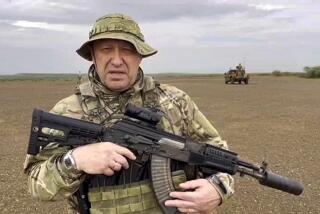Contrasts in Image : Gorbachev and KGB: Alliance That Pays Off
- Share via
WASHINGTON — The KGB, the Soviet Union’s secret police, is enjoying greater support from Soviet leader Mikhail S. Gorbachev than any other Soviet institution, according to U.S. and foreign analysts of Soviet affairs. In turn, they say, he seems particularly dependent on the agency and may be in the process of increasing its power.
The close relationship of the two is particularly striking in view of the contrast between Gorbachev’s image in the West as a liberal reformer seeking increased democratization of Soviet life and the KGB’s image as the Kremlin’s terror agency, with the blood of millions on its hands.
Among the evidence indicating the close rapport are these: The KGB is the only major institution that Gorbachev has not criticized publicly, and its chief, Viktor M. Chebrikov, has been accorded unprecedented high visibility.
Conservatives Reassured
The analysts say the Soviet leader needs a strong secret police organization to reassure conservatives that his reforms will not get out of hand--that while he is pushing a restructuring of economic and political life, the KGB remains on alert against dissident elements and liberalization trends getting out of control.
Since Gorbachev assumed the top Soviet post in March, 1985, KGB chief Chebrikov has been elevated to full membership in the Politburo and became the first member of that top ruling group to publicly endorse the new leader’s calls for change.
In Gorbachev’s first year in office, Chebrikov was designated to deliver a Revolution Day speech in the Kremlin and has become an active representative of Soviet foreign policy, making trips abroad that none of his predecessors were permitted.
At the same time, the role of his agency has been expanding.
More Responsibility Seen
According to intelligence reports, the KGB appears to be taking over more responsibility for conducting surveillance on the performance of economic and agricultural enterprises. In the past, this work was done by Communist Party officials assigned to the organizations. Now their authority appears to be declining, with the KGB picking up the slack, according to one foreign expert on Soviet affairs.
Gorbachev’s hand has been seen in the appointment of several additional new deputy chairmen of the KGB, with younger men replacing old guard officials, the analysts say. New KGB chiefs have been appointed in five of the 15 republics of the Soviet Union.
The Soviet leader’s support has been bolstering an agency that is already massive in size and pervasive in influence.
The direct descendant of the notorious Cheka political police created after the 1917 revolution, the Komitet Gosudarstvennoy Bezopasnosti (Committee on State Security) has approximately 100,000 staff officers and serves as both a federal police force and a domestic and foreign intelligence service.
In scope, it functions as the equivalent of the American CIA, FBI and National Security Agency rolled into one. In the intelligence field, only military surveillance is outside its domain.
Keeping Tabs on Critics
Analysts say Gorbachev’s close ties to the agency, in addition to helping quiet conservatives’ fears about the new internal reforms, are allowing him to keep better tabs on his own critics. Opponents undoubtedly exist in the Communist Party, the military and industry who feel threatened by his campaigns to root out corruption and increase efficiency.
Noting this concern, some observers believe that the Soviet leader will be giving increasing attention to the agency’s monitoring of internal dissent. They note that the new first deputy chairman of the KGB, Filipp D. Bobkov, was previously chief of the directorate responsible for such operations.
Gorbachev’s alliance with the KGB may go back to his student days, some observers say. While at Moscow State University, he was head of the Komsomol (Young Communists) organization. According to Dmitri Simes, a Soviet-born expert at the Carnegie Endowment for International Peace, there are reports that Gorbachev cooperated with the KGB’s campaign against “rootless cosmopolitans,” as Jews were euphemistically termed, in the immediate post-World War II period.
He is widely regarded as a protege of the late Yuri V. Andropov, long-time KGB chief before he became Soviet leader in 1982. Later, there were many reports that Chebrikov provided embarrassing files on the corruption of two of Gorbachev’s opponents, Moscow boss Viktor V. Grishin and Leningrad boss Grigory V. Romanov, which helped assure his selection as general secretary of the party two years ago.
Despite the longstanding relations and mutual benefits of an alliance, analysts stress that there is no certainty that the Soviet leader and the KGB will always remain “in bed,” as one put it.
Gorbachev’s aggressive reform agenda could exacerbate long-standing differences between the KGB’s domestic and foreign services, a senior Reagan Administration official said, weakening the organization’s commitment to him.
Agents in the foreign intelligence service are generally better educated and more sophisticated and are believed to endorse Gorbachev’s call for change. The “internal” KGB officers, who spy on Soviet citizens, are often derided as crude thugs by the Soviet intelligentsia and would be the more likely targets of corruption and favoritism charges.
Already, there have been some hints of possible strain.
Recently, Chebrikov spent five days on the Afghan border investigating a security lapse by internal KGB border guards in which Afghan rebels infiltrated into the Soviet Union, according to a report by Radio Liberty, a U.S. government station that broadcasts news and commentary into the Soviet Union.
Also, in January, Chebrikov wrote a Page 1 letter to the Communist Party newspaper Pravda, admitting that the head of the KGB in a Ukrainian city illegally imprisoned a Pravda journalist who was threatening to collect material about economic failures and corrupt party practices there.
Nevertheless, most analysts discount the likelihood of a serious rift.
More to Read
Sign up for Essential California
The most important California stories and recommendations in your inbox every morning.
You may occasionally receive promotional content from the Los Angeles Times.









